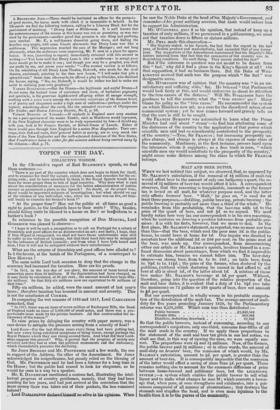MALT AND BEER DUTIES.
WI:mi. we last noticed this subject, we observed, that, as appeared by Mr. SALMON'S calculation, if the removal of 411 millions of malt-tax would affect beer to the amount of only one halfpenny a quart, the removal of 31 millions of beer-tax would affect it less. A correspondent observes, that this reasoning is inapplicable, inasmuch as the former tax is levied on all malt, for whatever purpose used, and the latter only affects brewers' beer. "Malt," he goes on, "is used for at least three purposes,—distilling, public brewing, private brewing : the public brewing is probably not more than a third of the whole." He concludes from this probability, that the beer-tax adds 1d. to the price of the quart of beer, and not id. as we argued. We need hardly notice how very lax our correspondent is in his own reasoning, when he ventures on drawing a 'positive inference from probable pre-, mises : it is with his facts, however, that we mean to deal. In the first place, Mr. SALMON'S statement, as reported, was no more nor less than this—that the beer, which cost the poor man 3d. in the publichouse, he could brew at home for ld. Our inquiry was directed to ascertain how the additional 2d. or 200 per cent. on the prime cost of the beer, was made up. Our correspondent, from misconceiving either our article or Mr. SALMON'S speech, involves himself in a confused discussion about percentages, from which we find it impossible to extricate him, because we cannot follow him. The beer-duty ranges—on strong beer, from 9s. to 9s. 10d. ; on table beer, from is. 91d. to is. I lid.; the price of the former, when doctored by the publican, (without which doctoring he cannot in fact afford to sell beer at all) is about 5d., of the latter about id. A mixture of these two makes Mr. SALMON'S beverage at 3d. per quart. Without, therefore, going into the question of the relative proportion of the malt and beer duties, it is evident that a duty of lls. 9/d. (we take the maximum) on 72 gallons or 288 quarts of beer, does not amount to id. per quart. But our correspondent is wholly wrong in his probable computation of the distribution of the malt-tax. The average amount of maltduty for five years preceding January 1828, by the Parliamentary returns was 3,576,390/. Which sum was thus distributed :— Public brewers £2,843,564
Private ditto 669,984 Distillers, deducting drawback 62,842
So that the public brewers, instead of consuming, according to our correspondent's conjecture, only one-third, consume four-fifths of all the malt made in the country. If we apply these proportions to the statement of the malt and beer tax given in our last notice, we shall see that, in this way of viewing the case, we were equally correct. The proportions were 44 and 3/ millions. Now, of the former, the public brewer paid 3i millions ; or in other words, the amount of malt-duty on brewers' beer, the remission of which would, by Mr. SALMON'S calculation, amount to /id. per quart, is greater than the amount of beer-tax. It is consequently impo,ssible that the remission of the latter would effect a saving of more than Id. per quart. There remains nothing else to account for the enormous difference of price between home-brewed and publicans' beer, but the LICENSING SYSTEM ;—a system which enables the public brewer to sell what liquor and to make what charges he sees fit; which converts a beverage that, when pure, at once strengthens and exhilarates, into a poi sonous compound of all manner of abominations ; that destroys the stomach and stupifies the head, and is even more injurious to the health than it is to the purses of the community,


















 Previous page
Previous page